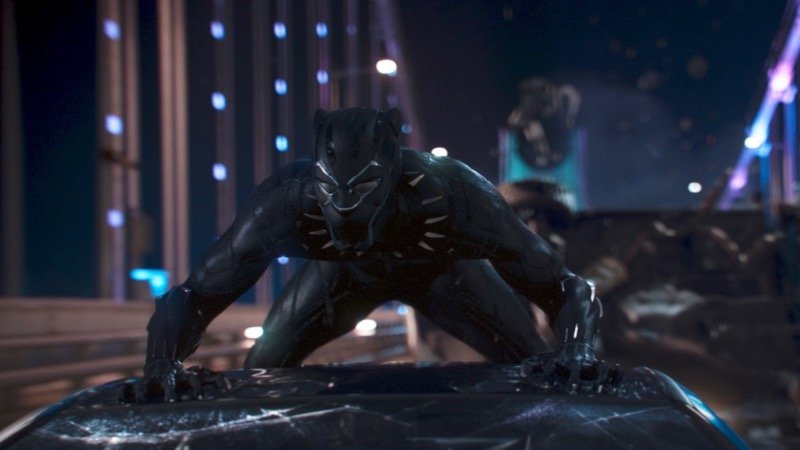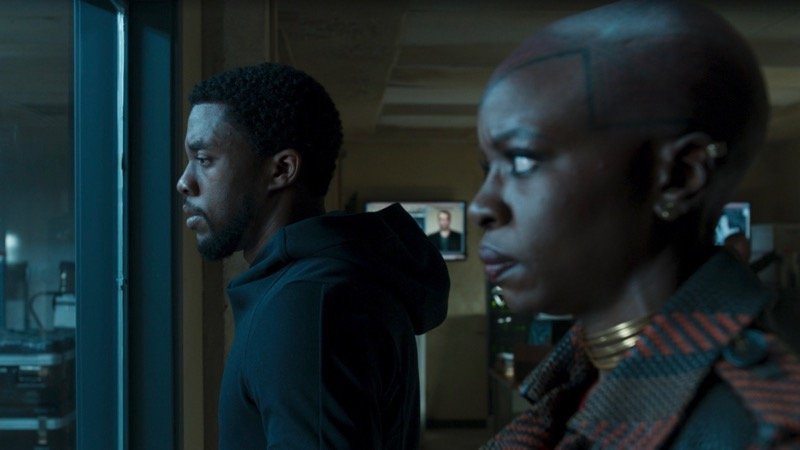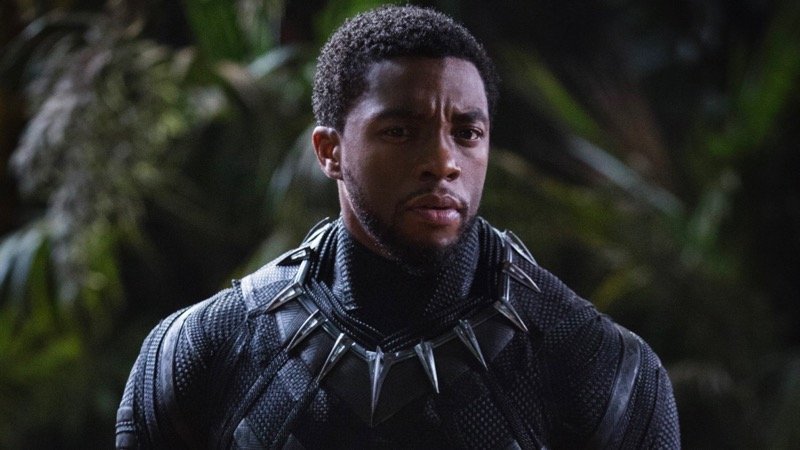Ever since Pinewood Atlanta was opened for business in 2014, Marvel Studios has called it home. Atlanta is the central hub for travel in the United States by air, and the great tax incentives that the state provides make it a prime target for film production, so it was an easy decision to make. Since that time, Ant-Man, Captain America: Civil War, Guardians of the Galaxy Vol. 2 and Spider-Man: Homecoming have all set up shop primarily in the Peach State.
When it came time to start shooting Black Panther, the King had to seek sets and studios elsewhere (since every stage at Pinewood Atlanta was taken by Marvel’s other in-production movie, Avengers: Infinity War). Black Panther instead filmed at the Screen Gems studio lot in downtown, previously the home of films like The Hunger Games: Mockingjay Parts 1 and 2, the first two Divergent films, and the Denzel Washington-starring Flight. This is where we find Chadwick Boseman playing the character once again.
Boseman stands in a CIA safe house wearing a regular kind of outfit, just a black hoodie and pants, as he watches someone he’s been looking for for a longtime, and someone he’s never shared the screen with to this point: Andy Serkis’ Ulysses Klaue. We already know, thanks to Avengers: Age of Ultron, that these two share a history, but we’ll get to learn even more about it and the world of the Black Panther in the film.
“It’s shortly after ‘Civil War’ has ended, so he’s still mourning,” Boseman tells us about T’Challa’s headspace in the film. “There’s unrest in Wakanda. So what he’s dealing with is being the king and making the transition to filling the footsteps of his father. (The film) is probably going to feel like it’s more about the political unrest than the superhero, initially.”
Though his character is still attempting to navigate the waters of becoming a monarch, it’s not something that he’s afraid of, as Boseman tells us.
“He’s been prepared for it his whole life. He’s groomed, so to speak, to do it. I think it’s just the mental transition and it does not help – like if his father had decided that he was going to step down, I’m too old, I can’t do it anymore, then that would be a different scenario. But because he died in the last movie, I think the transition has to do with that mourning process and just the mentality – he’s been groomed to do it.”

“It begins where ‘Civil War’ left off,” producer Nate Moore adds. “So obviously that movie had a big impact on T’Challa because of T’Chaka’s death. Now we answer the question, What happens when he goes home? Who rules Wakanda? How does Wakanda now deal with the loss of a king who was a fair king, who people seemed to like? And is T’Challa ready to be the king of Wakanda?”
The most exciting thing about his own solo movie of course is getting to expand on the things that were only teased in Captain America: Civil War.
“Not to say that there wasn’t a deep understanding (of the character), but some of the things that we came to an understanding of we couldn’t show in the last one, so it gives it a chance to marinate,” Boseman says. “And those certain things that we were unsure about now we’re 100 percent sure about, like even down to accent and how you walk or what his sense of humor is, which actually develops more in this movie because in the last movie he was pretty focused on what he had to do, so there was no time to make any jokes. But in this one you’re sort of seeing him around in his more natural environment and around people that he knows. So you are different according to the people you are around.”
And the people that Boseman’s hero is around in the film will fully define him, from Angela Bassett as his mother Ramonda, Forest Whitaker as his trusted advisor Zuri, and Letitia Wright as his little sister, Shuri.
“It’s not very often that you see a superhero with a little sister,” Boseman says with a smile. “It’s not unheard of but it’s an unusual thing, so I think it brings out a different part of his character. Usually you have the damsel in distress. I don’t think there are any damsels in distress in this movie. That doesn’t exist in this movie.”
In the film, Shuri is the head of the Wakandan design group, a teenage girl who is smarter than Tony Stark and builds all of the tech for her big brother. She even gives his suit an upgrade after the events of Civil War.

As Boseman watches Andy Serkis through glass, there’s a rumble in the other room. Someone is trying to break out Klau and they’re armed. Boseman shifts a little in his stance, an indicator that a visual effect will be added later where the Black Panther suit has morphed onto his body. A grenade gets launched into the room (another effect that will be added later) and Boseman leaps on the live explosive, his Vibranium suit absorbing most of the impact. Fans are going to lose it when they see him moving in the suit and acting like a hero for his own film, but their reaction isn’t something that Boseman is thinking about.
“I’m not saying I expected the fan reaction to be what it was, but to a certain degree I’m unaware of the fan reaction… I see certain things, but I see it in a different way because it’s important for me to not look at everything that’s happening, so I see it because some stuff is impossible to not see. But there’s a certain removal I have to have from it in order to play it, because you have people saying it’s got to have this or it’s got to have that and if I was to follow their thoughts from the last one it would’ve been a lot of stuff that was wrong.”
Fan expectations aside, Boseman is happy to carry the pressure of playing the role, which is only bolstered by his great working relationship with Marvel, something we don’t think will be ending anytime soon.
“They have a good batting average in terms of successful films and films that people love, and to be specific about this film and this character, it’s just a good character…Obviously you’ve never seen a movie like this before, so it’s just cool. For me every project it has to be something that’s challenging and cool and that’s a challenge for me. It keeps me interested. So that’s all that really matters. This is definitely one of them.”
Black Panther will debut in theaters on February 16.










